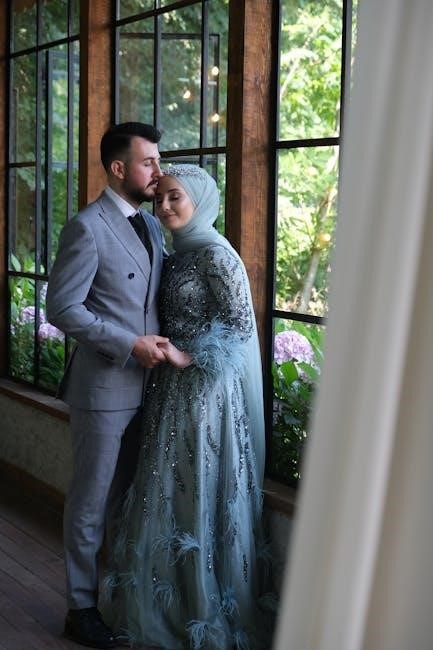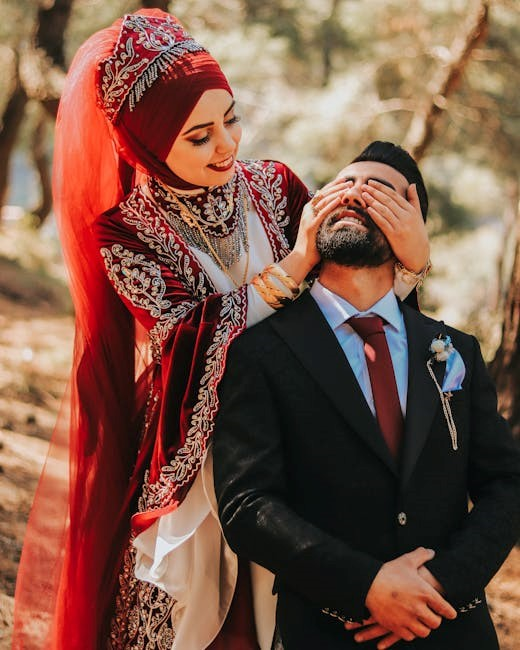An Islamic marriage contract is a legally binding agreement outlining mutual rights and responsibilities of spouses under Islamic law, ensuring a harmonious and equitable union.
1.1 Definition and Purpose of an Islamic Marriage Contract
An Islamic marriage contract, also known as a Nikah agreement, is a legally binding document that outlines the mutual rights, responsibilities, and expectations of the bride and groom. Its primary purpose is to establish a foundation of trust, respect, and fairness in the marriage, ensuring both partners adhere to Islamic principles. The contract typically includes details such as the dowry (Mahr), financial support, and other agreed-upon terms. It serves as a safeguard for both spouses, providing clarity on their roles and obligations. The contract is enforced under Islamic law and is witnessed by two adults, making it a formal and sacred commitment. By defining clear expectations, it aims to promote harmony and stability in the marriage, aligning with the teachings of the Quran and Sunnah.
1.2 Historical and Cultural Significance
The Islamic marriage contract, or Nikah, holds profound historical and cultural significance, tracing back to the time of the Prophet Muhammad (saw). It was established to formalize marriages, ensuring they were conducted with mutual consent and fairness. Culturally, the contract symbolizes the union of two individuals and their families, embodying Islamic values of respect, trust, and commitment. The dowry (Mahr) included in the contract reflects the groom’s dedication to the bride, a practice upheld for centuries. This document serves as a sacred commitment, preserving family lineage and heritage while adhering to Islamic teachings. Its historical roots and cultural relevance continue to make it a cornerstone of Muslim weddings worldwide, ensuring a stable and honorable foundation for married life.

Essential Components of an Islamic Marriage Contract
An Islamic marriage contract includes personal details of the bride and groom, dowry terms, witness signatures, and agreed-upon conditions, ensuring clarity and mutual consent in the union.
2.1 Personal Information of the Bride and Groom
The Islamic marriage contract requires detailed personal information of both the bride and groom, including their full names, dates of birth, and permanent addresses. This ensures the authenticity and legal validity of the union. Additionally, the contract may include the names and signatures of the witnesses, who are typically male adults of sound mind and good reputation. The inclusion of such personal details is essential for verifying the identities of all parties involved and ensuring that the marriage is conducted in accordance with Islamic law. This section is crucial for maintaining transparency and accountability in the marital agreement. The personal information serves as a formal record of the union, providing a clear and binding foundation for the relationship.
2.2 Dowry (Mahr) Details
The Islamic marriage contract requires the specification of the dowry, known as mahr, which is a gift from the groom to the bride. This can be in the form of money, jewelry, or other valuables, and its amount is typically agreed upon by both parties. The mahr symbolizes the groom’s commitment to the bride’s financial security and well-being. It is usually divided into two parts: an immediate payment and a deferred payment, which is given at a later time, often upon divorce or the husband’s death. The dowry details are explicitly outlined in the contract to ensure clarity and mutual understanding, reflecting Islamic values of fairness and justice in the marital relationship. This section is vital for safeguarding the bride’s rights and ensuring a equitable union. The mahr is a fundamental aspect of the Islamic marriage contract, emphasizing the groom’s responsibility toward the bride’s welfare.
2.3 Witnesses and Their Role
In Islamic marriage contracts, the presence of witnesses is mandatory to validate the union. Typically, two adult male witnesses of good moral character are required. They must be mentally sound and capable of understanding the proceedings. The witnesses’ role is to attest that both parties consent to the marriage willingly and without coercion, ensuring the marriage’s validity under Islamic law. Their signatures on the contract serve as legal confirmation, making the union officially recognized within the community. Additionally, witnesses may provide support in case of future disputes, highlighting their importance in upholding the integrity of the marriage agreement. Their involvement ensures transparency and adherence to Islamic principles, reinforcing the societal acknowledgment of the union. The witnesses’ participation is thus essential for the marriage’s legal and social recognition.
2.4 Terms and Conditions Agreed Upon

The Islamic marriage contract outlines specific terms and conditions mutually agreed upon by the couple, ensuring clarity and harmony in their relationship. These terms often include financial obligations, such as the dowry (mahr), and responsibilities like household management or emotional support. Both partners may negotiate clauses related to education, employment, and domestic duties to suit their lifestyles. The contract may also address dispute resolution mechanisms, such as mediation or arbitration, to ensure conflicts are resolved amicably; Modern contracts increasingly incorporate clauses about equality, shared financial responsibilities, and mutual respect. These terms are designed to safeguard the rights of both spouses and promote a balanced partnership, reflecting Islamic values of justice and fairness. The agreed-upon conditions are legally binding and serve as a foundation for a stable marital relationship.

Legal Implications of an Islamic Marriage Contract
An Islamic marriage contract holds legal significance, outlining enforceable rights and responsibilities of spouses, blending religious principles with civil law for mutual protection and clarity in disputes.
3.1 enforceability in Secular Courts
3.1 Enforceability in Secular Courts
The enforceability of Islamic marriage contracts in secular courts varies by jurisdiction but often depends on their alignment with local laws. In many cases, these contracts are recognized as legally binding documents, provided they comply with civil legal standards. Courts typically assess whether the agreement was entered into voluntarily and whether it adheres to principles of fairness and justice. For instance, clauses related to dowry, financial support, and property rights may be upheld if they do not conflict with secular legal frameworks. However, certain religious stipulations may require additional legal review to ensure compatibility with civil law. This duality highlights the balance between honoring religious traditions and upholding secular legal systems.
3.2 Rights and Responsibilities of Spouses
In an Islamic marriage contract, spouses are granted specific rights and responsibilities, emphasizing mutual respect and cooperation. The husband is typically obligated to provide financial support, including the dowry and maintenance, while the wife is entitled to fair treatment and emotional well-being. Both partners are expected to uphold fidelity and contribute to the household’s harmony. Islamic law underscores the importance of shared responsibilities, such as raising children and managing family affairs, though specific duties may vary based on cultural and individual agreements. The contract often includes stipulations ensuring equitable division of assets and clear guidelines for resolving disputes amicably. By outlining these obligations, the contract fosters a balanced and respectful relationship, aligning with Islamic teachings on partnership and justice in marriage;

Drafting an Islamic Marriage Contract
Drafting an Islamic marriage contract involves using templates that outline terms, dowry, and responsibilities, ensuring compliance with both Islamic law and legal requirements.
4.1 Sample Islamic Marriage Contract Template
A sample Islamic marriage contract template is a structured document that outlines the essential components of the marriage agreement. It typically includes sections for personal information of the bride and groom, dowry details, terms and conditions agreed upon, and spaces for signatures of the couple and witnesses; The template ensures compliance with Islamic law while providing flexibility to include modern clauses such as education, work, and financial arrangements. Many templates are available online, offering customizable options to suit individual needs. They often include pre-drafted clauses to protect the rights of both spouses and provide a clear framework for resolving disputes. Using a sample template can streamline the drafting process, ensuring all necessary aspects are covered. Legal experts and Islamic scholars often recommend reviewing and personalizing these templates to align with specific circumstances and cultural practices.
4.2 Common Stipulations in the Contract
Common stipulations in an Islamic marriage contract often include the dowry (mahr) payment, financial support obligations, and mutual respect and fidelity. Clauses may outline expectations for maintaining faith, family values, and domestic duties. Some contracts include provisions for conflict resolution, such as mediation or arbitration, to ensure disputes are addressed amicably. Additionally, stipulations may cover the wife’s right to work or pursue education, ensuring equality and mutual support. These clauses are designed to protect the rights of both spouses and provide a clear framework for the marriage. They are often negotiable and tailored to the couple’s specific needs while adhering to Islamic principles. Proper documentation ensures these stipulations are legally binding and enforceable.
4.3 Role of Islamic Scholars and Legal Experts
Islamic scholars and legal experts play a crucial role in drafting and validating marriage contracts, ensuring compliance with Islamic law and local regulations. Scholars provide guidance on religious requirements, such as the inclusion of proper dowry terms and witness signatures. Legal experts help ensure the contract is legally enforceable, often advising on issues like property rights and inheritance. Together, they help couples navigate cultural and legal expectations, making the contract both religiously and legally sound. Their involvement safeguards the rights of both spouses and ensures the document aligns with both Islamic principles and secular legal standards, providing a balanced and comprehensive agreement for the marriage.
Modern Trends in Islamic Marriage Contracts
Modern Islamic marriage contracts increasingly incorporate digital platforms for e-signatures and online drafting, ensuring accessibility while maintaining religious and legal integrity, reflecting contemporary societal needs and advancements.
5.1 Digitalization and E-Signatures

Digitalization has transformed Islamic marriage contracts, enabling couples to draft and sign agreements online. E-signatures simplify the process, allowing spouses and witnesses to authenticate documents remotely. Online platforms like Jotform and specialized Islamic marriage contract templates offer customizable solutions, ensuring compliance with Shariah principles. Digital contracts enhance accessibility, reducing logistical challenges for couples in different locations. Witnesses can now sign digitally, maintaining the integrity of Islamic traditions while embracing modern technology. This trend aligns with contemporary needs, making the process efficient and environmentally friendly. Legal experts and Islamic scholars often endorse these tools, ensuring that digital contracts remain valid under both religious and secular laws. This innovation preserves the sacredness of the nikah while adapting to the demands of a tech-driven world.
5.2 Inclusion of Modern Clauses (e.g., Education, Work, Finances)
Modern Islamic marriage contracts increasingly incorporate clauses addressing education, work, and financial arrangements to reflect contemporary lifestyles. These clauses ensure mutual support and equality, aligning with Islamic values while addressing modern needs. For instance, couples may include agreements on pursuing higher education, balancing career ambitions, or managing joint finances. Such provisions help prevent conflicts and promote harmony, ensuring both partners contribute equally to the household. These clauses are negotiated with the guidance of Islamic scholars and legal experts, blending traditional principles with modern realities. By addressing these aspects, couples can build a stronger foundation for their marriage, ensuring it remains balanced and equitable in today’s fast-paced world.
An Islamic marriage contract promotes harmony and equity, blending tradition with modern needs, ensuring a balanced and adaptable foundation for marital success in contemporary society and beyond.
6.1 Importance of an Islamic Marriage Contract in Contemporary Society
An Islamic marriage contract holds significant value in modern society by providing clarity on the rights and responsibilities of both spouses, fostering mutual respect and understanding. It serves as a safeguard against disputes by outlining clear terms and conditions, ensuring fairness and equity in the relationship. The contract’s adaptability to contemporary needs, such as including clauses on education, work, and finances, makes it a practical tool for couples seeking harmony and balance in their marriage. Additionally, it promotes gender equality and protects the interests of both partners, aligning with modern societal values while respecting Islamic traditions. This document is not only a legal framework but also a spiritual foundation, emphasizing the importance of mutual consent and cooperation in building a successful marital life.
6.2 Future of Islamic Marriage Contracts
The future of Islamic marriage contracts lies in their adaptability to modern societal changes while preserving Islamic values. Digitalization and e-signatures are expected to make these contracts more accessible and efficient. The inclusion of modern clauses, such as those related to education, work, and finances, ensures relevance in contemporary settings. Collaboration between Islamic scholars and legal experts will continue to refine these contracts, addressing emerging challenges while maintaining religious authenticity. Additionally, the increasing recognition of Islamic marriage contracts in secular legal systems highlights their evolving role in providing legal protection for spouses. As society progresses, these contracts will remain a vital tool for fostering harmonious marriages, balancing tradition with innovation to meet the needs of future generations.
